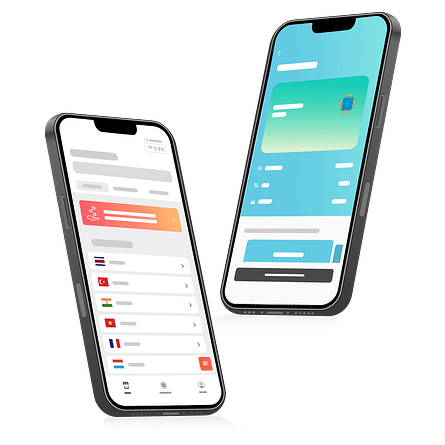
Trip returns are a mixed bag. You’re happy to be home — but sad it’s over. You’re refreshed — but immediately overwhelmed by an overflowing inbox. You checked everything off your list — but are dreading checking your post-vacation balance. Then, suddenly, a notification shakes you from your post-vacation haze. It’s time to pay your credit card bill, and you’ve spent way more than you intended — again.
It doesn’t matter how many times you’ve done it; ending your vacation with financial regrets stings. So, let’s do things differently in 2024. With these tried-and-true budget travel tips at the ready, you’ll get more for your money, stay within budget — and even have some cash leftover to start planning your next adventure.
In this article:
- Why should you travel on a budget?
- 12 tips for travelers on a budget
- Stay connected—and on budget—wherever you travel
- Traveling on a budget FAQs
Why Should You Travel on a Budget?
When you hear the phrase "budget-travel," you probably envision dingy youth hostels, sweaty bus rides, and living off peanut butter sandwiches. Accurate? Maybe, but that’s not the only way to travel on a budget. Budgeting isn’t about spending as little as possible (at least not for everyone). It's about getting the best bang for your buck — and who doesn’t want that?
Beyond the financial considerations, being mindful of your budget encourages creativity and resourcefulness that can lead to unique and enriching experiences that wouldn’t have otherwise made it onto your itinerary. So, while there are undeniable perks of luxury travel, embracing a budget-friendly approach opens the door to unexpected adventures and nurtures your aspirations to travel more often.
 Freepik
Freepik
12 Tips for Travelers on a Budget
Ready to step outside your comfort zone and travel more for less? You’ve come to the right place. These simple (yet effective) budget-friendly travel tips will ensure your next adventure is filled with authentic experiences, local gems, and breathtaking sights — all without breaking the bank.
Plan — and Book Early
Whether you’re looking at hotels, cruises, flights, or activities, the early bird really does catch the worm. Why? Well, it all comes down to economics. When availability is high, these businesses lower their prices to fill up their rooms or seats. As you get closer to your desired date, availability typically decreases, pushing prices higher.
Although there are no hard and fast rules as to how far in advance you should book, all signs point to as early as possible. So, as soon as your boss signs off on your vacation request, start booking!
Be Flexible on Your Flight Dates
Flights will generally be one of your biggest travel expenses, which means getting a stellar deal can have a massive impact on your overall budget. As a general rule of thumb, budget-savvy travelers book mid-week flights about one to two months before their date of departure. But that’s not always possible. If you’re more of a last-minute planner, you can still snag a deal by having flexible dates, using fare comparison sites to compare prices and set alerts, and signing up for airline emails for access to special discounts and offers.
Concerned about your flight price going up after repeated searches? There’s a hack for that. Using a Virtual Private Network (VPN) not only conceals your IP address but also allows you to explore flight prices from different countries. Airlines usually offer lower prices when booking from locations like Mexico, Thailand, or Malaysia — allowing you to book the same flight, for less.
Get the Most From Your Accommodation While Spending Less
Although it may be tempting to book a more affordable three-star hotel on the outskirts of the city, there are always tradeoffs to consider. Things like additional transportation expenses, time, and itineraries based on public transport can drastically affect your travel experience. Plus, there's the added risk of compromising on cleanliness and safety, as hinted by those three-star reviews.
To avoid booking something that leaves you feeling more anxious than rested, book early and check out vacation rentals in the area. This can be particularly budget-friendly for those traveling in groups. Or if you have a favorite international hotel chain, sign up for their loyalty programs for exclusive deals and discounts.
Embrace Public Transport
While navigating public transport systems in foreign countries may not be a walk in the park, it sure beats spending hundreds of dollars on taxis. If you’re traveling to a major city like London or Tokyo, take the time to get familiar with the lines and routes you’ll need once you’re there.
Consider mapping out how to get from the airport to your hotel and the best route to any area you’ll be frequenting. And don’t forget to research the pricing options. It’s usually more affordable to buy multi-day passes or tickets in bulk.
 Freepik
Freepik
Combine Destinations
Itching to see more than one spot on your trip? That’s actually a smart budget choice. After all, if you’ve already booked the time off, you might as well make the most of it. Planning an itinerary that connects nearby destinations allows you to take advantage of local transportation (like buses, trains, and ferries) and see more of the world for less. So, pull up a map with your travel buddies to see what’s nearby, and don’t be afraid to explore small towns (they usually have amazing food, lower prices, and hospitable locals).
Pack Smart To Avoid Unnecessary Expenses
Do you want to know the worst way to spend your hard-earned travel money? Baggage fees. Plus, it’s not exactly fun to cart around a massive suitcase. If the length of your trip permits, stick to a carry-on to reduce baggage fees and eliminate the potential for lost luggage. Airtags or not, it happens.
To avoid overpacking the night before your trip, plan ahead. Pick neutral, versatile clothing options that you can easily mix and match and a few practical pairs of shoes. Whatever you do, leave the stilettos at home — they’re not made for long days of sightseeing or running to catch your connecting flight.
Take Advantage of Free Attractions While Traveling
Although there are certain activities and attractions worth splurging on, there are plenty of free ones, too. Many destinations offer free walking tours guided by locals that are jam-packed with local history and stories — plus there’s always the opportunity to get a local opinion on the best places to visit while you're there.
Aside from tours, many museums offer free admission days or ask for a small donation in place of an entrance fee. And don’t forget, there’s more to see in this world than man-made attractions. Most outdoor attractions and national parks are free to visit, and much more awe-inspiring than anything you’ll find in the city.
Balance Eating at Restaurants and Cooking Your Own Food
As much as you’d like to eat your way through Italy (and who wouldn’t?), having every meal in a restaurant is a surefire way to break the bank. Balancing restaurant meals with more affordable on-the-go options and cooking will reduce your costs without taking away from the culinary delights of travel. Whether you decide to snag a famous amago sando (egg salad sandwich) from a convenience store in Japan or cook up a meal with fresh ingredients from a local market, your tastebuds will be just as happy, at a fraction of the cost.
 Freepik
Freepik
Travel Where Your Money Goes Further
Instead of trying to make your budget stretch further in an expensive destination like Switzerland, travel to places where you get more for your money. Because no matter how beautiful the destination, if it doesn’t align with your budget, you probably won’t have the best experience. So, if you’ve painstakingly crunched the numbers only to find out that you have a mere $10/day to spend, consider a more budget-friendly destination like Bali, Honduras, or Tenerife.
Travel Off-Season
Have your heart set on a pricey destination that you’re not willing to miss? Consider traveling off-season for lower hotel rates and fewer crowds. If the off-season means missing out on specific activities, like skiing or sunbathing, the shoulder season provides the perfect compromise. This sweet spot between peak and off-peak times allows you to snag lower hotel rates and dodge the crowds while still enjoying reasonable weather — making it an ideal time for budget-conscious travelers.
Prepare For Unexpected Expenses
To ensure unexpected expenses don’t blow your budget, it’s always best to be prepared. Emergency medical costs, trip interruptions, and unpredictable cellphone charges are a few of the biggest question marks when it comes to travel budgeting. To avoid the first two, get travel insurance with coverage for trip cancellations and medical emergencies immediately after you book your trip. That way, if your plans change, you won’t be on the hook for a flight you don’t take. And if your travels do go as planned, you’ll be covered should any accidents occur.
Avoid Roaming Fees With an eSIM
Whether you need to unexpectedly navigate to your hotel when the shuttle doesn’t show up or quickly translate a menu, your phone can be a much-needed lifeline while you’re abroad. So, even if you don’t plan on using it much, it’s always best to pre-plan how you’ll stay connected. But with international roaming fees and usage restrictions, the wrong plan can quickly throw your entire travel budget off course. With an eSIM from Airalo, you can stay connected for less and avoid those unpredictable roaming charges from bursting your budget-friendly bubble.

Stay Connected—and on Budget—Wherever You Travel
After carefully budgeting out every aspect of your trip, coming home to an unexpectedly high cellphone bill can be a tough pill to swallow. Even more so once you realize you could have avoided roaming charges altogether by downloading a local eSIM.
Whether you’re exploring the vibrant streets of Tokyo or meditating on a secluded beach in Bali, Airalo provides seamless and cost-effective communication, wherever your travels take you.
Don’t let roaming fees ruin your post-vacation high. Stay connected without breaking the bank with an eSIM from Airalo.
Traveling on a Budget FAQs
What Things Should You Consider When Making a Travel Budget?
When making your travel budget, it’s important to consider your non-negotiables. This could be anything from a certain location, attraction, type of accommodation, or excursion. Taking the time to rank the importance of each area and researching local costs will help you create the travel experience you want while staying within budget.
What Are the Best Places To Travel When You’re on a Budget?
While there are countless budget-friendly options, here are a few of the best places to travel on a budget by region:
- Africa:
- Marrakech, Morocco
- Zanzibar, Tanzania
- Americas:
- Mexico City, Mexico
- Quito, Ecuador
- Asia:
- Hanoi, Vietnam
- Pokhara, Nepal
- Europe:
- Budapest, Hungary
- Prague, Czech
- Oceania:
- Bali, Indonesia
- Fiji (specifically, exploring some of the less touristy islands)
What Things Should Be Included in Your Travel Budget?
When building your travel budget, start with the basics. Check out the destination's cost of living, considering things like accommodation, transportation, dining, shopping, and any other relevant activities. This will help you get an idea of how long you’ll be able to stay while staying within budget. Don’t forget to consider pre-trip costs like passports, visas, vaccinations, travel insurance, flights, communication needs (like an eSIM), and any trip-related shopping too.



